Essay 2 Magic of Memory
advertisement
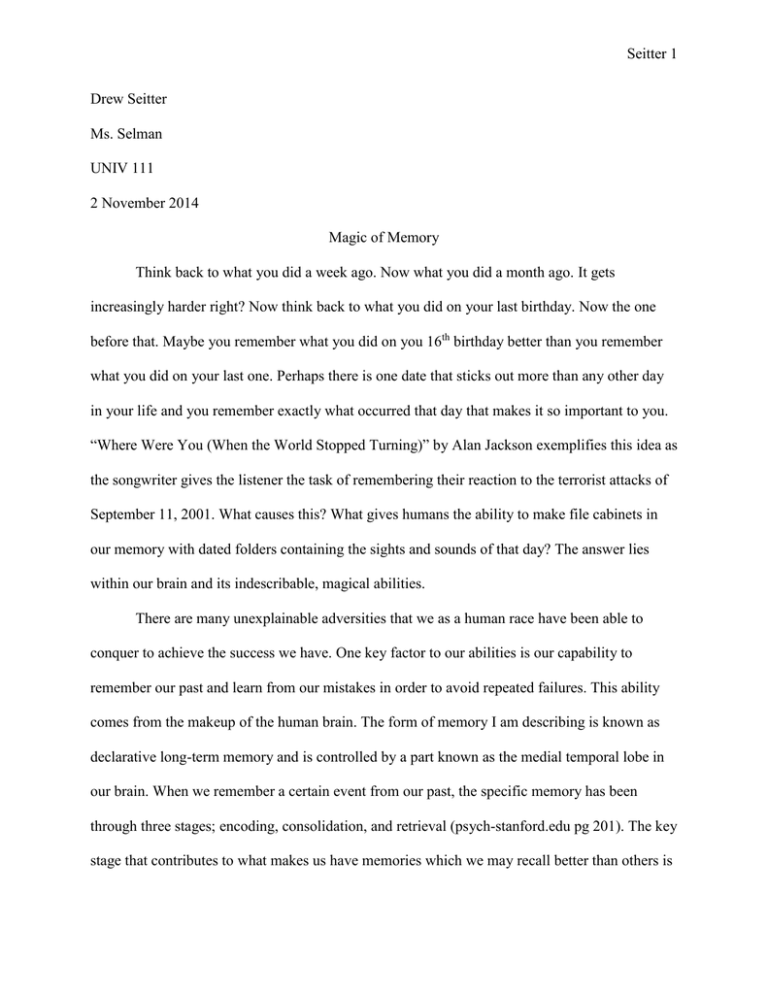
Seitter 1 Drew Seitter Ms. Selman UNIV 111 2 November 2014 Magic of Memory Think back to what you did a week ago. Now what you did a month ago. It gets increasingly harder right? Now think back to what you did on your last birthday. Now the one before that. Maybe you remember what you did on you 16th birthday better than you remember what you did on your last one. Perhaps there is one date that sticks out more than any other day in your life and you remember exactly what occurred that day that makes it so important to you. “Where Were You (When the World Stopped Turning)” by Alan Jackson exemplifies this idea as the songwriter gives the listener the task of remembering their reaction to the terrorist attacks of September 11, 2001. What causes this? What gives humans the ability to make file cabinets in our memory with dated folders containing the sights and sounds of that day? The answer lies within our brain and its indescribable, magical abilities. There are many unexplainable adversities that we as a human race have been able to conquer to achieve the success we have. One key factor to our abilities is our capability to remember our past and learn from our mistakes in order to avoid repeated failures. This ability comes from the makeup of the human brain. The form of memory I am describing is known as declarative long-term memory and is controlled by a part known as the medial temporal lobe in our brain. When we remember a certain event from our past, the specific memory has been through three stages; encoding, consolidation, and retrieval (psych-stanford.edu pg 201). The key stage that contributes to what makes us have memories which we may recall better than others is Seitter 2 the encoding stage. This stage occurs as the event occurs and what makes memories more or less encoded in our brain is the attention level which we give the event. For example, on your 16th birthday, you were fully attentive to the events happening because it was important to you. However, say a month ago, the events occurring may not have affected you as much, therefore causing you to give the events less attention, and causing your brain to encode these events less than important ones. The specific cause of what is remembered or forgotten is credited to neural responses in our brain as an event happens (psych-stanford.edu pg 208). When an event has a higher impact on you, you are more attentive and elaborative of what is happening, therefore sending more neural responses. The greater amount of neural responses cause more encoding of the event in your brain, resulting in more specific features of the event to be passed on into the next stage of long-term memory, consolidation. Consolidation occurs over an extended period of time after the event occurs and happens because of a constant recollection of the event. After a certain prolonged period of time which the event has been repeatedly recalled, the memory becomes separate of the medial temporal lobe which encoding occurs. Once the event has been successfully consolidated, it is transferred in the brain as a memory to the lateral cortical regions. The last stage of memory is the retrieval process, which becomes activated by certain cues. For example, when I asked you what you did on your 16th birthday, it was a cue which provoked your brain to find the file in your brain titled “My 16th Birthday.” When Alan Jackson wrote the song, he included the lyrics “On that September day” (Jackson). This was written for listeners who knew about the September 11 attacks and was intended to send a cue causing them to search for the file in their brain cabinet labeled “September 11, 2001.” When an event occurs, its fate has one of two options-to be remembered or forgotten. Through research, we have discovered tips we can use to control the determination of the episode Seitter 3 in our brain. The Bucks County Community College has developed keys for their students in order to help for studying to help remember subjects which they might be struggling in (faculty.bucks.edu). We can relate these subjects to events that occur in our lives. They began by evaluating four theories as to which we may forget certain events in our memory. The first is fading, which states that if you do not continually review a subject or event, it will be forgotten. This theory was assessed in a study done with the students by asking them about remembering textbook materials over a certain period of time which concluded that the percentage of material remembered decreased as the time past had increased. Relating this to our question stated earlier, we determine that as time goes by, the events we encounter day by day get lost in our mind. The second theory to explain why we forget is called the Retrieval Theory. This states that when you have forgotten something, it is due to the fact that the subject has been misplaced in the file cabinet of our brain. Whether the subject has disappeared from the cabinet or has been lost, it has the same fate-it has been forgotten. So if you have misplaced the file of what you did a month ago, it is lost in your mind. The third theory is the Interference theory, which is found upon the idea of limited space in long-term memory. Because of this limited space, every time you are adding new information, there becomes a clash between the new information and older information in the brain. As a result, some information replaces other info and causes it to be lost and forgotten. So every day, you are adding new events to your mind and these experiences get caught in with past experiences and there becomes a struggle for your mind to retain every piece of information of every event. The last belief as to why we forget knowledge in our brain is due to what is known as interactive interference. This theory can be based upon the idea that when you are comprehending material or events, you tend to put the most focus on what occurs first and last. This causes everything in the middle to be in a sort of haze. For example, relating to the Seitter 4 September 11 terrorist attacks, many people are able to recall where they were when they first heard of the events occurring that day. Because of all of these factors occurring in our minds, it is no surprise that many events become lost in time. After coming up with this list of reasons why we may forget items that are thrown into our brain, the Bucks County Community College created a list of keys that you may use to remember information taken in every day (faculty.bucks.edu). The first key is to choose to remember by being interested and attentive to what is going on throughout the day. This can explain why we may remember dates which important things occurred as our interest is higher and therefore our attention is raised, creating more memories in our mind. The next is to visualize things which you want to stay in your mind over an extended amount of time. Visualizations are able to stay in our mind much better than words so picturing words causes the words to stay in our brain longer and clearer. This could be why it is much easier to picture the events of September 11 rather than remembering an article about the events. The third key is to relate events and information together. When you do this, the material is able to link itself to each other in your brain and make them easier to recall when you want to remember them. For example, when you go on a vacation, the experiences link together in a file in your brain, making the events easier to relive as a whole. The last key is to repeat the information you want remembered in your head over and over until it has been engraved in your mind. So when you constantly remember how great or devastating your 16th was, the event becomes engraved in your mind for an extended time. The bottom line as to why we remember events and material better than others is, as memory researcher and specialist Edward Bolles stated, “We remember what we understand; we understand only what we pay attention to; we pay attention to what we want.” Seitter 5 (faculty.bucks.edu) Therefore, to answer our question as to why we remember some days more than others, we remember best what we want to remember. The attacks of September 11 were important to us because of the mass impact it had on our nation, therefore making our brains want to remember what we did that day. When you are remembering your 16th birthday clearer than your last birthday, it is because you wanted to remember your 16th birthday more for the impact it had on you. Taking this to the extreme, there are more than likely events you recollect on a daily basis that are events that have impacted your life hugely, causing a clear picture of that occurrence in your brain which can last for an extremely long time, maybe even forever. In a sense, these events have become a part of you as a human being. So you can credit a large part of who you are today to the important memories of your past experiences. However, always keep in mind that these memories were once present events which were important to you for some reason or another. Therefore, I advise you to always stay aware of what is happening in the world around you because you never know when one of those lasting memories might arise. Seitter 6 Works Cited “Encoding and Retrieval for Long-Term Memory.” pag. 192-238. psych.stanford.edu: Web. 29 Oct. 2014. Jackson, Alan. Where Were You (When the World Stopped Turning). Keith Stegall, 2001. Print. Meg Keeley. “Memory and the Importance of Review.” The Basics of Effective Learning. Bucks County Community College, 1997. N. pag. faculty.bucks.edu: Web. 29 Oct. 2014.
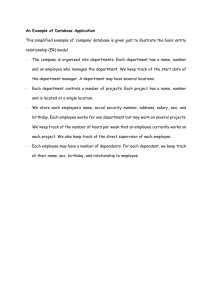


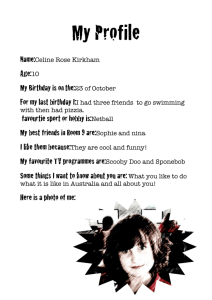
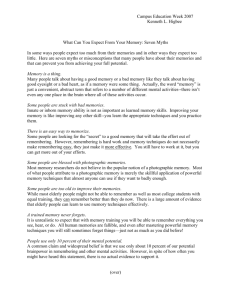

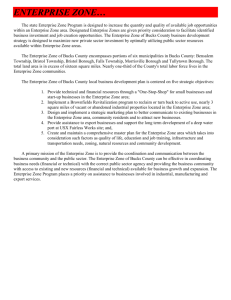
![You`re invited to celebrate [child`s name]`s birthday at SCRAP! What](http://s3.studylib.net/store/data/007177272_1-c15601fb9e11b26854f13f1982e634e8-300x300.png)
